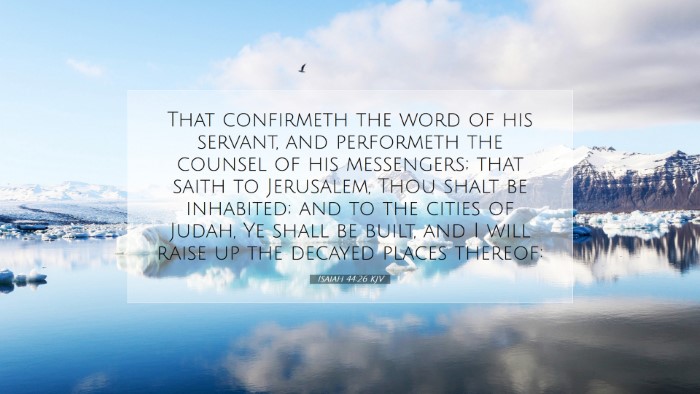Commentary on Isaiah 44:26
Bible Verse (Isaiah 44:26): "Who confirms the word of his servant and fulfills the counsel of his messengers; who says of Jerusalem, 'She shall be inhabited,' and of the cities of Judah, 'They shall be built, and I will raise up their ruins.'
Introduction
In this verse, we see God’s profound sovereignty and faithfulness in fulfilling His promises. Understanding this passage involves diving into the context of Isaiah's prophecies, the meaning of the servant and the messenger, and the assurance God provides to His people. This commentary draws on insights from esteemed theologians such as Matthew Henry, Albert Barnes, and Adam Clarke.
God’s Assurance in Prophecy
Matthew Henry emphasizes that God's fidelity to His word highlights His omnipotence. He notes that God “confirms the word of His servant,” indicating that He empowers the declarations made by His prophets to come to fruition. In doing this, God assures His church and people of His presence and action in their history.
Albert Barnes elaborates on the concept of “fulfilling the counsel of His messengers.” He insists that the term "counsel" refers to the divine plans and intentions that God has purposed. God does not simply allow events to transpire; He enacts His will with assurance. Barnes points out that God's counsels are both wise and effective, meaning that what He has decreed will undeniably come to pass.
The Role of the Servants and Messengers
Adam Clarke provides a distinctive view of the significance of ‘servants’ and ‘messengers.’ He posits that these figures epitomize prophets and individuals God has chosen to communicate His will. The effectiveness of their message is contingent upon God's enabling and assurance. Clarke illustrates that this verse is a pivotal reminder that, regardless of external circumstances, divine promise remains unshakeable.
The Promise of Restoration
This passage carries a powerful promise, particularly related to Jerusalem and Judah. As highlighted by Matthew Henry, the affirmation “She shall be inhabited” signifies hope for renewal after the devastation of exile. This is not merely an optimistic forecast; it is a prophetic declaration of God’s restoration. Henry emphasizes that such prophecies serve to strengthen the faith of believers facing trials.
Albert Barnes expands on this by noting that the phrase “I will raise up their ruins” speaks to the act of God rebuilding His people. It symbolizes a covenantal promise that points toward a fuller restoration, which ultimately finds its fulfillment in Christ. Barnes correlates this with the Christian understanding of reconciliation and restoration under the New Covenant.
Theological Implications
The implications of this verse reach wide into both historical and contemporary theological discussions. It challenges the reader to consider not only the faithfulness of God in restoring His people but the certainty with which that restoration is prophesied. The character of God is at the forefront here, emphasizing His reliability and commitment to His people.
Adam Clarke relates these themes to the eventual coming of Christ, indicating that the ruins raised are representative of a spiritual restoration. Thus, the verse not only reflects a historical moment but invites believers into an understanding of God’s ongoing work among His people.
Conclusion
Isaiah 44:26 stands as a profound declaration of God’s sovereignty, faithfulness, and the powerful realization of His promises through His servants. Through the insights of Henry, Barnes, and Clarke, we grasp the magnitude of God’s assurances in a time of struggle for Israel. This passage calls us, as modern readers, to trust in the God who builds up and restores, reminding us that His word is unfailing and sovereignly fulfilled.


